A pig’s head sits atop a shelf, tufts of blonde hair sprouting from its taut scalp. Opposite, its chalky, wrinkled heart glows red in a bubbling vat of liquid, locks of thick dark hair and teeth scattered below. A giant screen shows the pig draped in a hospital gown. Is it dead? A surgeon inserts human teeth implants, then hair implants — beautifying the horrifyingly human-like animal.
Chang Chen-shen (張辰申) calls Incarnation Project: Deviation Lovers “a satirical self-criticism, a critique on the fact that throughout our lives we’ve been instilled with ideas and things that don’t belong to us.”
Chang is among 10 finalists in last year’s Taipei Art Awards whose work is currently on display at the Taipei Fine Arts Museum until March 2. It is decisively contemporary — exhibits are written, filmed, even rapped, offering alternative mediums and compelling storytelling.
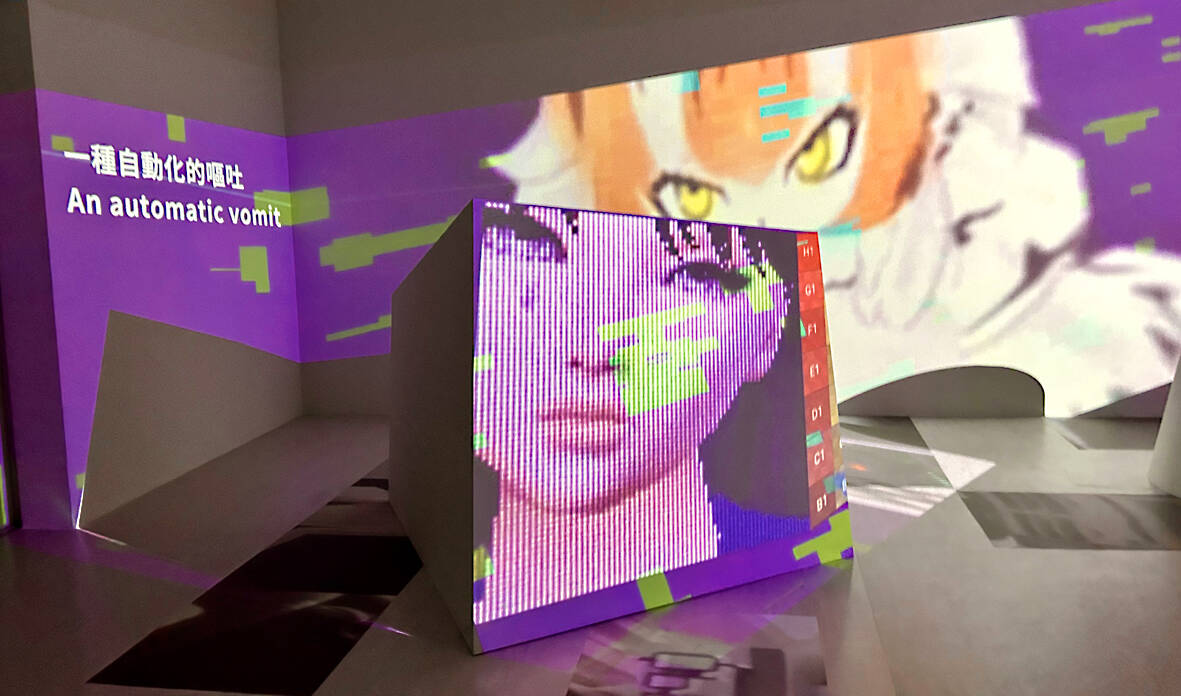
Photo: Hollie Younger, TT
Each artist is given a room of their own, offering up parallel universes from the violent and uncomfortable to the nostalgic and emotive to the futuristic and sci-fi.
The largest and impactful exhibit is Father’s Vital Collection: Heaven and Earth Are My Buildings, And Houses My Clothes, How Come Y’all Step Into My Trousers? by Sim Chang (張哲榕), its contents as delightfully complex as its title.
The space recreates his father’s second-hand book store, with piling yellowed pages and photographs of his father roaming the streets of Taipei collecting pots, pans and all manner of junk.
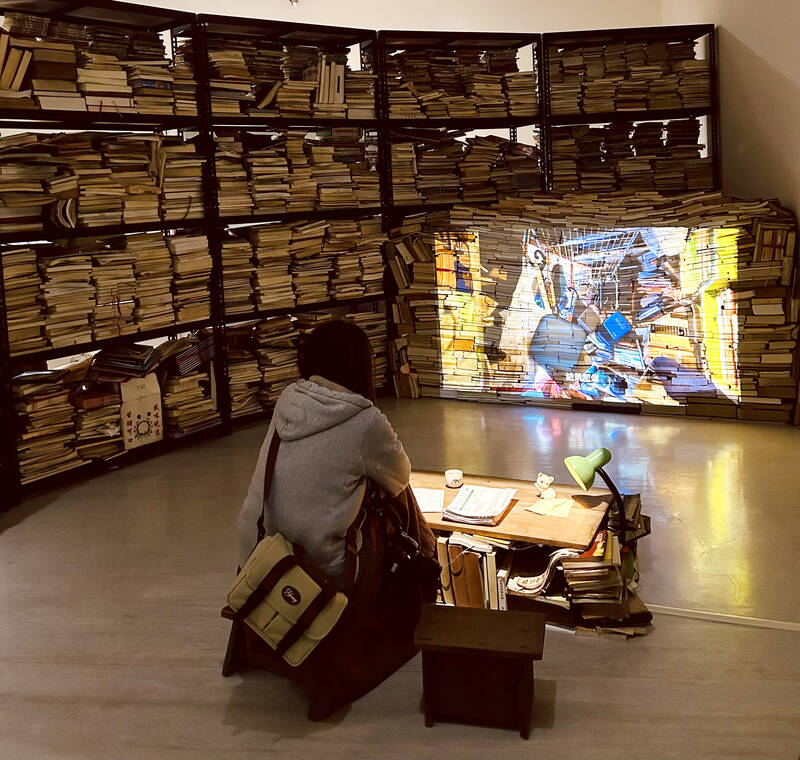
Photo: Hollie Younger, TT
Interspersed with the fading books and photographs, Sim Chang lays bare the soaring highs and crashing lows of his bipolar disorder, which he was diagnosed with while working on this project. Combined, the visitor is immersed in the world created by two minds — one that is at times manic, the other exhibiting the compulsion to hoard.
Sim Chang says his condition has “gifted [him] with something special,” because it enables him to understand and sympathize with his father. It also bestowed him with natural rhyming abilities — abilities that combine in a featured video of him rapping in a frenzy, while sitting on his father’s “vital collection.”
Poyuan Juan’s (阮柏遠) Yes, I’m a simp. Simply in love with... elicits concerns for the incoming age of AI and lives lived digitally. We are warned before entering: “only suitable for over-18s due to scenes of a sexual nature.”
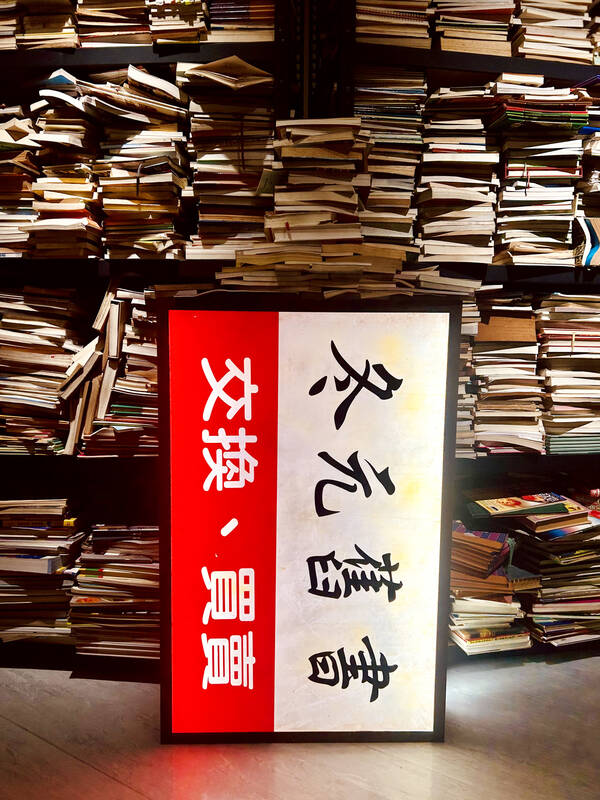
Photo: Hollie Younger, TT
Yet it’s not so much explicit as it is strange.
“An automatic vomit,” an AI sex doll says non-sensically on a glitchy, anime-inspired multiscreen display. The room glows neon green and shades of violet, robotic voices echoing through the exhibit’s clean negative spaces.
Juan’s work explores online romantic relationships experienced through “the emotional linkage of the spirit and the sensory perception of physical contact.”
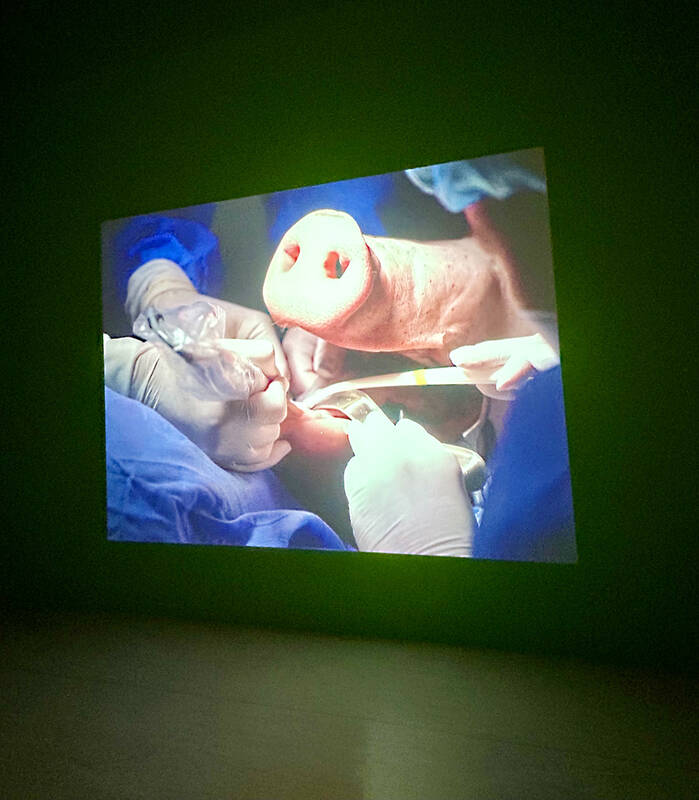
Photo: Hollie Younger, TT
Another screen projects a live video stream, as a wide-eyed, nearly-naked cartoon girl receives thousands of messages from “simps,” a Gen-Z insult for those who obsess over a romantic interest, lusting over a sexualized protagonist while hunched over computer screens.
Oversized iPhone screens flick mindlessly through Instagram reels; the exhibit explores “the overlapping of digital and real spaces, much like being trapped in a social media browsing loop,” Juan says.
The work of the young artists exhibited this year is interconnected in its feeling — futuristic, yet worryingly of the now.
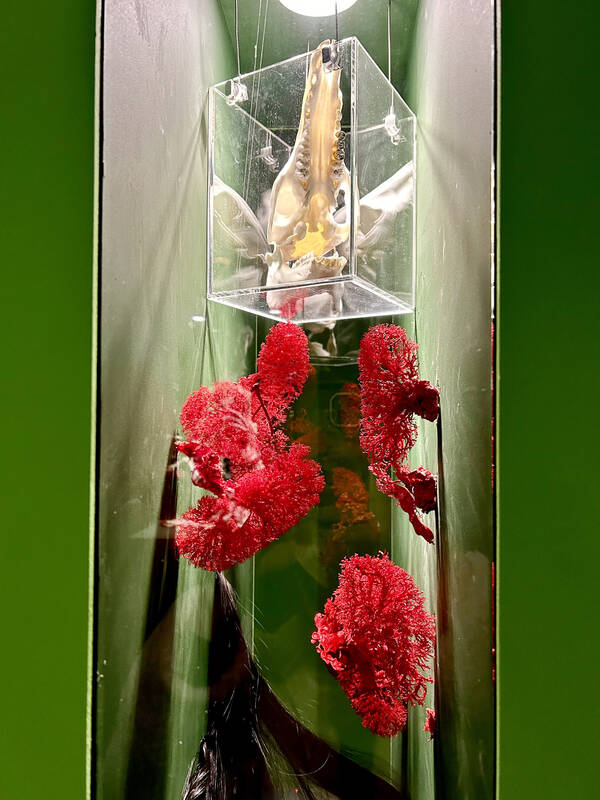
Photo: Hollie Younger, TT

One of the biggest sore spots in Taiwan’s historical friendship with the US came in 1979 when US president Jimmy Carter broke off formal diplomatic relations with Taiwan’s Republic of China (ROC) government so that the US could establish relations with the People’s Republic of China (PRC). Taiwan’s derecognition came purely at China’s insistence, and the US took the deal. Retired American diplomat John Tkacik, who for almost decade surrounding that schism, from 1974 to 1982, worked in embassies in Taipei and Beijing and at the Taiwan Desk in Washington DC, recently argued in the Taipei Times that “President Carter’s derecognition

This year will go down in the history books. Taiwan faces enormous turmoil and uncertainty in the coming months. Which political parties are in a good position to handle big changes? All of the main parties are beset with challenges. Taking stock, this column examined the Taiwan People’s Party (TPP) (“Huang Kuo-chang’s choking the life out of the TPP,” May 28, page 12), the Democratic Progressive Party (DPP) (“Challenges amid choppy waters for the DPP,” June 14, page 12) and the Chinese Nationalist Party (KMT) (“KMT struggles to seize opportunities as ‘interesting times’ loom,” June 20, page 11). Times like these can

Dr. Y. Tony Yang, Associate Dean of Health Policy and Population Science at George Washington University, argued last week in a piece for the Taipei Times about former president Ma Ying-jeou (馬英九) leading a student delegation to the People’s Republic of China (PRC) that, “The real question is not whether Ma’s visit helps or hurts Taiwan — it is why Taiwan lacks a sophisticated, multi-track approach to one of the most complex geopolitical relationships in the world” (“Ma’s Visit, DPP’s Blind Spot,” June 18, page 8). Yang contends that the Democratic Progressive Party (DPP) has a blind spot: “By treating any

You can tell a lot about a generation from the contents of their cool box: nowadays the barbecue ice bucket is likely to be filled with hard seltzers, non-alcoholic beers and fluorescent BuzzBallz — a particular favorite among Gen Z. Two decades ago, it was WKD, Bacardi Breezers and the odd Smirnoff Ice bobbing in a puddle of melted ice. And while nostalgia may have brought back some alcopops, the new wave of ready-to-drink (RTD) options look and taste noticeably different. It is not just the drinks that have changed, but drinking habits too, driven in part by more health-conscious consumers and